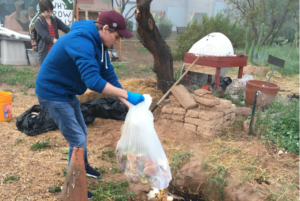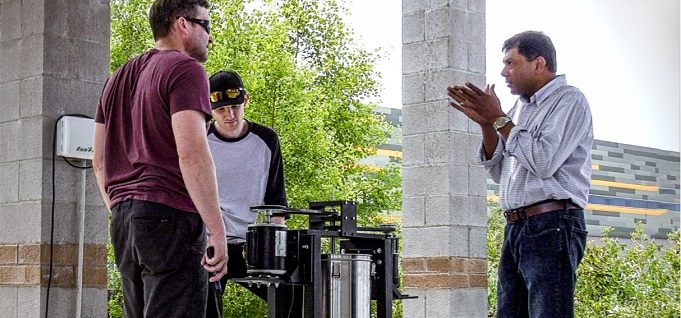From concept to reality
By AACC 21st Century Center Staff
July 2, 2019
Sustainability efforts have led to student learning experiences at an Arizona college.
In Arizona, Chandler-Gilbert Community College (CGCC) is merging sustainability with experiential learning in its Food Waste Recycling Project. In the campus-wide collaborative project offers students unique opportunities to practice translational science, bringing new ideas to the public while fostering critical thinking and confidence in their innovative potential.
In the fall of 2018, students across such disciplines as biology, English and engineering began participating in the program through semester-long supporting projects, which have included studying the broad impacts of food waste on the environment analyzing and modifying campus community behavior around food waste sorting and designing and constructing a pilot food waste digester machine.
Full-time and adjunct faculty, facility operations, food service, marketing and media staff work to optimize the student learning experience.
The progress of the ever-expanding project is monitored from semester to semester. Students have deployed food waste bins so food waste can be collected, weighed, sorted and composted. Biology students have worked to analyze the scope of the food waste problem on campus will guide students in determining techniques to improve participation in waste sorting and increase awareness. Students determined that, during the 2018-2019 school year, a total of 1,370 lbs of food waste was diverted from the landfill, and students measured a 37 percent contamination rate from the food waste collected from cafeteria bins.

In May, engineering students completed the food digester machine and tested it for the first time on campus. By combining food waste, water and the selected bacteria strains and heating the mixture for six hours, they ended up with a successful first batch of liquid fertilizer.
In the meantime, English students have been conducting surveys on the “sustainability mindset” of the campus population, to assess beliefs and behaviors around food waste and recycling.
Students are even helping to fund the project. In the spring semester, they worked in groups to complete two grant proposals.
“Not only do the students have a hand in creating an innovative solution to the food waste problem, but they learn the steps that it takes to bring an innovative idea from concept to reality. They are building real-world skills that they can use in their future careers or innovative endeavors,” said Miriam Kleinman, a biology professor.
The success has led to some recognition, too. This spring, CGCC won Districtwide Innovation of the Year award for the project, receiving $2,000 for future innovation.
“At Chandler-Gilbert, we pride ourselves on sustainability and cross-disciplinary programs, and the Food Waste Recycling Project encompasses both of these principles,” CGCC President Greg Peterson said. “This collaborative effort from students, staff and faculty showcases the outstanding student research and learning happening at our college.”



